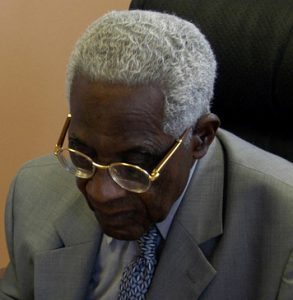Aime Cesaire

“Aimé Césaire, in full Aimé-Fernand-David Césaire, (born June 26, 1913, Basse-Pointe, Martinique—died April 17, 2008, Fort-de-France), Martinican poet, playwright, and politician, who was cofounder with Léopold Sédar Senghor of Negritude, an influential movement to restore the cultural identity of black Africans.
Together with Senghor and others involved in the Negritude movement, Césaire was educated in Paris. In the early 1940s he returned to Martinique and engaged in political action supporting the decolonization of the French colonies of Africa. In 1945 he became mayor of Fort-de-France, the capital of Martinique, and he retained that position until 2001 (he was briefly out of office in 1983–84). In 1946 Césaire became a deputy for Martinique in the French National Assembly. Viewing the plight of the blacks as only one facet of the proletarian struggle, he joined the Communist Party (1946–56). He found that Surrealism, which freed him from the traditional forms of language, was the best expression for his convictions. He voiced his ardent rebellion in a French that was heavy with African imagery. In the fiery poems of Cahier d’un retour au pays natal (1939; Return to My Native Land) and Soleil cou-coupé (1948; “Cutthroat Sun”), he lashed out against the oppressors.
Césaire turned to the theatre, discarding Negritude for black militancy. His tragedies are vehemently political: La Tragédie du Roi Christophe (1963; The Tragedy of King Christophe), a drama of decolonization in 19th-century Haiti, and Une Saison au Congo (1966; A Season in the Congo), the epic of the 1960 Congo rebellion and of the assassination of the Congolese political leader Patrice Lumumba. Both depict the fate of black power as forever doomed to failure”.

Culture and Colonization (2010)
Citation: Césaire, Aimé. Culture and Colonization. University of Yaoundé, 1978.
Info: “Culture and Colonization,” which has long been unavailable in English translation, was Aimé Césaire’s speech at Le Premier Congrès International des Ecrivains et Artistes Noirs, hosted by the journal Présence africaine in Paris in September 1956”.

Discourse on Colonialism (1972)
Citation: Césaire, Aimé. Discourse on Colonialism. Monthly Review Press, 1972.
Info: Aimé Césaire’sDiscourse on Colonialismmight be best described as a declaration of war. I would almost call it a “third world manifesto,” but hesitate because it is primarily a polemic against the old order bereft of the kind of propositions and proposals that generally accompany manifestos.

“Rereading Aime Cesaire: Negritude as Creolization” (2015) Souleymane Bachir Diagne
Citation: Diagne, Souleymane Bachir. “Rereading Aimé Césaire: Negritude as Creolization.” Small Axe, vol. 19, no. 3 48, 2015, pp. 121–128., doi:10.1215/07990537-3341717.
Info: “This contribution is an invitation to reread Negritude in general, and Césaire’s works in particular, as a movement and not an essence. It is a reflection on Césaire’s latest work, Nègre je suis, nègre je resterai (Negro I Am, Negro I Shall Remain), which is a response to those who considered Negritude something of the past to be superseded by the movement of creolization”.

“From Louverture to Lenin: Aime Cesaire and Anti-Colonial Marxism” (2015) by Nick Nesbit
Citation: Nesbitt, Nick. “From Louverture to Lenin: Aimé Césaire and Anticolonial Marxism.” Small Axe, vol. 19, no. 3 48, 2015, pp. 129–145., doi:10.1215/07990537-3341729.
Info: “ This essay argues that Aimé Césaire remained committed to a nonaligned, tricontinental Marxism well beyond his resignation from the Parti Communiste Français in 1956”

“Free and French in the Caribbean: Toussaint Louverture, Aimé Césaire, and narratives of loyal opposition” (2013) by John Patrick Walsh
Citation: Cunningham, Tomaz. “Free and French in the Caribbean: Toussaint Louverture, Aimé Césaire and Narratives of Loyal Opposition by John Patrick Walsh.” Journal of Haitian Studies, vol. 20, no. 2, 2014, pp. 213–216., doi:10.1353/jhs.2014.0020.
Info: “In Free and French in the Caribbean, John Patrick Walsh studies the writings of Toussaint Louverture and Aimé Césaire to examine how they conceived of and narrated two defining events in the decolonializing of the French Caribbean: the revolution that freed the French colony of Saint-Domingue in 1803 and the departmentalization of Martinique and other French colonies in 1946” .
“What is Mine: Cesairean Negritude between the Particular and the Universal” (2002) by Doris L. Garraway
Citation: Garraway. “‘What Is Mine’: Césairean Negritude between the Particular and the Universal.” Research in African Literatures, vol. 41, no. 1, 2010, p. 71., doi:10.2979/ral.2010.41.1.71.
Info: “Considering contemporary criticisms of Césaire’s most important theoretical construct, Negritude, in light of the anti-essentialist turn in postcolonial studies, this article deploys the critical vocabulary of Frantz Fanon in order to read Césaire as a theorist of colonial disalienation whose Negritude is not a fixed object but a process through which Césaire comes to problematize both black essentialism and the very idea of racial particularism itself”.

“The Assumption of Negritude: Aime Cesaire, Frantz Fanon, and the Vicious Circle of Racial Politics” (2002) by Robert Bernasconi
Citation: Bernasconi, Robert. “The Assumption of Negritude: Aimé Césaire, Frantz Fanon, and the Vicious Circle of Racial Politics.” Parallax, vol. 8, no. 2, 2002, pp. 69–83., doi:10.1080/13534640210138946.

“The Dialectic of Colonialism and Culture: The Origins of the Negritude of Aime Cesaire” (1979) by Dale Tomich
Citation: Tomich, Dale. “The Dialectic of Colonialism and Culture: The Origins of the Negritude of Aimé Césaire.” Review (Fernand Braudel Center), vol. 2, no. 3, 1979, pp. 351–385. JSTOR, www.jstor.org/stable/40240804.
“No one colonizes innocently. No one colonizes with impunity either. A civilization which justifies colonization—and therefore force—is already a sick civilization, a civilization which is morally diseased.”
“Colonization = ‘thingification’.”
“I have a right to be a barbarian in your eyes. I refuse to be civilized at the price of my identity.”
“They talk to me about progress, about achievements, diseases cured, improved standards of living… I say: look at the corpses piled up by colonization.”
RELATED THEMES
